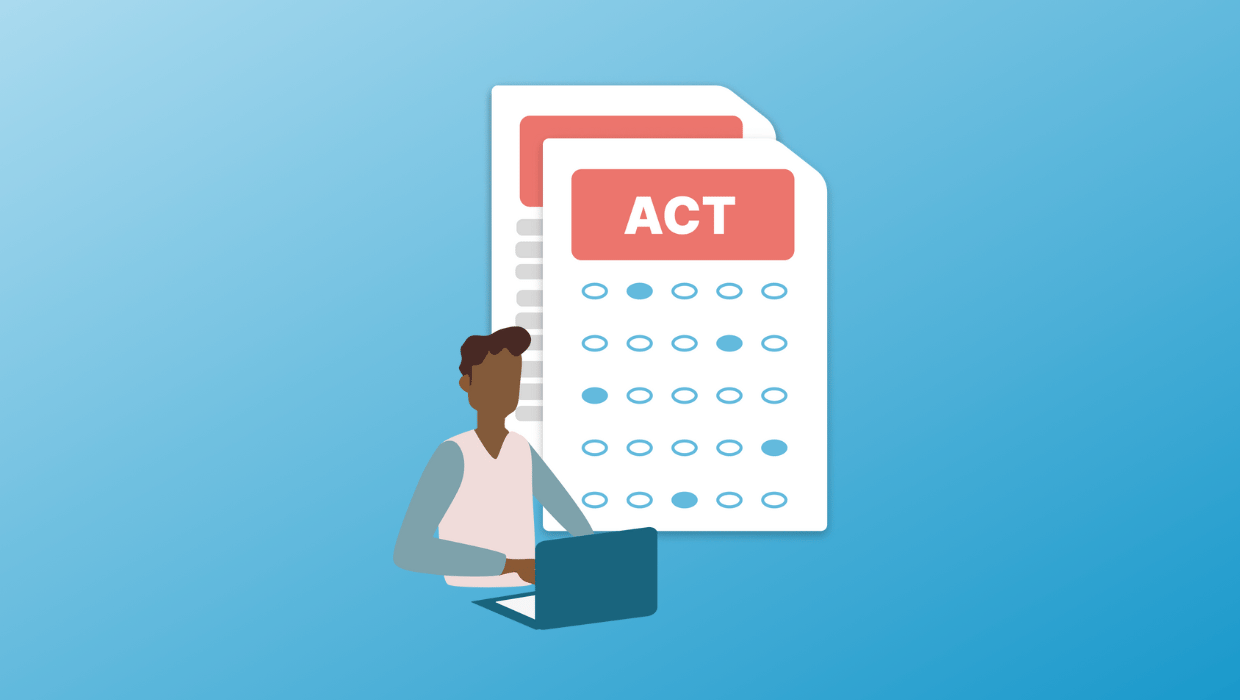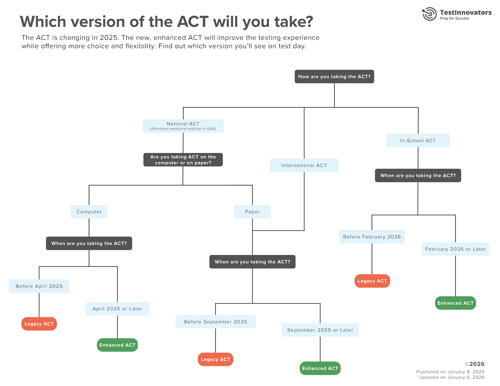2 min read
Top 3 Benefits of the Scoir Counselor Collective
The Scoir Counselor Collective was created for you—school counselors looking to strengthen their network and build community among each other. As...
Free for students & their families
Seamlessly integrated, affordable systems for use across your district.
Career Readiness for 6-8 grade, built to guide and track progress in the early years of career exploration.
Scoir + Common App are integrated for the 2025-26 academic year!
Check out content and practical guides to help inform your enrollment strategies and programs.

This blog post was provided by Test Innovators, our test prep partner. You can learn more about Test Innovators on our partners page.
The ACT is a readiness test, primarily used by colleges for admissions. But ACT test scores serve multiple purposes in addition to college entry, such as course placement and scholarships. Many high schools, districts, and states use the test to assess and monitor school performance. Several states even require the ACT for high school graduation!
This year, ACT is rolling out some big changes. The new, enhanced ACT has fewer questions, takes less time, and allows for more time per question. Plus, the Science Test is now optional, along with the Writing Test.
In this guide, we’ll walk you through what you need to know about the enhanced ACT.
Let’s dive into the details:
The ACT is changing in a few ways. The biggest change is that the new version is shorter. It includes just three core sections: English, Math, and Reading. It’s 2 hours and 5 minutes long, with a total of 131 questions. In contrast, the legacy ACT has four sections (English, Math, Reading, and Science) and is 2 hours and 55 minutes long, with 215 questions.
That means the enhanced ACT is 50 minutes shorter and has 84 fewer questions. And the best part? You actually get more time per question on the new test!
Another big change is that the Science Test is no longer required, but you’ll still have the option to take it. When you register, you can choose one of four versions:
A few other changes:
Fundamentally, the ACT is still testing the same underlying skills and concepts (though the emphasis in some areas has shifted slightly).

The ACT is rolling out the enhanced version gradually throughout the year. So, when will you see the new test? It depends on how and when you’re taking the test.

The enhanced ACT has three core sections: English, Math, and Reading. There are also two optional sections: Science and Writing.
The structure of the test is as follows:
Total test time:

The ACT is scored on a scale from 1 to 36. First, your raw score for each section is calculated by adding up the number of questions you answered correctly. There’s no penalty for incorrect answers, so there’s no harm in guessing if you’re unsure about a question.
Your raw score for each section will then be converted to a scaled score from 1 to 36, which helps ensure consistency and fairness across different test dates.
On your score report, you’ll see a Composite score along with each of your section scores. The Composite score is the average of your three core section scores (English, Math, and Reading) rounded to the nearest whole number.
Because the Science Test is optional, it’s not included in the Composite score for the enhanced ACT. If you choose to take it, you’ll receive a separate Science score and a STEM score, which is the average of your Math and Science scores.
If you take the optional Writing Test, your essay will be evaluated by two trained readers. Each reader will give your essay a score from 1 to 6 based on a standard rubric. The two readers’ scores will be added together to give you a score between 2 and 12. Visit ACT’s website to learn more about how the ACT Writing Test is scored.
If you take the ACT more than once, you’ll receive a Superscore, which is the average of your best section scores across all of your test dates. On the enhanced ACT, your Superscore Composite is the average of your best English, Math, and Reading scores, rounded to the nearest whole number.
If you’ve taken both the legacy ACT and the enhanced ACT, your Superscore Composite will still be calculated using your highest section scores from any version of the test. However, Science is not included, since it’s not part of the enhanced ACT Composite score. Your highest Science score (from either the legacy or the enhanced test) will still appear on your score report.
It depends! A “good score” is one that helps support your application to the schools and programs that interest you. Many colleges publish test score data for their admitted students, and Scoir’s Scattergrams show you past test score and GPA data from applicants from your high school.
Look at the data from the schools you want to apply to and set a target score range for yourself. As you look at this data and set your goal, remember that a perfect score does not guarantee acceptance, nor does a below-average score guarantee rejection. Schools use your scores in the context of the rest of your application. Just like your transcript, letters of recommendation, and personal statement, your ACT scores are a way to learn more about you.
Once you set your target score, it’s time to get to work! Learn how to prepare for the ACT.
The ACT English Test is the first section you’ll see on the ACT. You’ll find passages with underlined (or highlighted) portions and corresponding multiple-choice questions. Some questions will refer to these underlined portions, while others will refer to a section of the passage or the passage as a whole.
The questions will test you on the following writing and composition skills:
You’ll play the role of editor and determine the choice that best improves the passage, or in some cases, decide when no change is needed at all.
You’ll have 35 minutes to answer 50 questions, which gives you 42 seconds per question.
Taking the legacy ACT? Visit ACT’s website for more details on the legacy English Test.
The ACT Mathematics Test is the second section of the test. You’ll have 50 minutes to answer 45 multiple-choice questions.
You’re permitted to use a calculator for the entire section. Please refer to ACT’s website for more details on the calculator policy.
The ACT Math Test is designed to evaluate your knowledge of the math typically covered by the beginning of senior year. The content breakdown of the ACT Math Test is as follows:
While you should know basic formulas, such as the area of a circle and the Pythagorean theorem, the ACT does not require you to memorize complex formulas.
Taking the legacy ACT? Visit ACT’s website for more details about the legacy Math Test.
After a 15-minute break, you’ll move on to the Reading Test, which consists of prose passages with corresponding multiple-choice questions. You’ll have 35 minutes to read the passages and answer 40 questions.
Here is the content breakdown for the ACT Reading Test:
The passages on the Reading Test cover a wide range of topics and reflect the difficulty level of the texts you’ll encounter in your first year of college. Note that some passages may be accompanied by informational tables and graphs. Other passages feature 2 texts that you’ll be asked to compare.
Visit ACT’s website for more details about the Reading Test.
The Science Test is optional on the enhanced ACT. If you’d like to take the Science Test, be sure to register for the ACT with Science.
You’ll see passages about topics in biology, chemistry, Earth/space sciences, and physics with corresponding multiple-choice questions. At least one of the passages will also focus on engineering and design thinking. Some of the passages will include tables and graphs.
There are three types of passages:
You’ll see questions relating to the following:
The ACT Science Test is in many ways a reading comprehension test with a data literacy component. For the most part, the passages and accompanying tables and graphs will give you all the information needed to answer the questions, so advanced knowledge is not required. That said, a few of the questions do require some basic background knowledge and understanding of science and the scientific method.
Taking the legacy ACT? Visit ACT’s website for more details about the legacy Science Test.
The ACT Writing Test is optional for students who are taking the ACT on a standard Saturday date. If you’d like to take the Writing Test, be sure to register for the ACT With Writing.
If you are taking the ACT on a school day, please check with your counselor to see if it includes the Writing Test.
The Writing Test is 40 minutes and will be the final section of the test. You’ll see a prompt presenting a complex issue with three different perspectives on that issue. You’ll be asked to present your own stance and analyze the relationship between your own perspective and at least one of the three stances provided in the prompt.
If you are taking the test on paper, you’ll need to handwrite your response in pencil (unless you have an accommodation).
Most colleges do not require the ACT Writing Test. However, there are a small number that do. Be sure to check the requirements of your application schools when registering for the ACT.
Visit ACT’s website for more information about taking the ACT Writing Test.
The ACT and SAT are very similar tests. For the most part, they evaluate the same knowledge and skills, and colleges accept either one. That said, there are significant differences in the format and the overall testing experience, so you’ll probably find that you prefer one over the other.
The best way to figure out which test is right for you is to take a practice test for each and see which test goes better. Did you prefer the experience of one over the other? Here are some factors to consider:
When it’s time to decide which test you’d like to take, there’s no right or wrong answer. They’re both great options, so figure out which you prefer and focus on that one.

Some students take both the ACT and the SAT. Taking both isn’t necessary. You're usually better off focusing on maximizing your score on one of the tests. However, there are a few circumstances where it might make sense to take both:
If you do decide to take both tests, preparing for one will likely help the other. However, as the tests ultimately have distinct formats and some differences in content, it’s best to focus on one test at a time.
If you’re curious which test may be best for you, check out: ACT or SAT? Everything You Need to Know to Choose the Best Test for You.
The ACT is administered on seven Saturdays every year. These standard test dates occur during the following months:
You can view and register for upcoming test dates on ACT’s website.
Some schools and districts also offer the test during the school day. Please check with your counselor to see if your school offers school-day testing.
The best way to set yourself up for success is by taking challenging classes in school that require reading, writing, and critical thinking. The ACT rewards strong readers. After all, two of the three core sections are passage-based. Being a strong reader is a big advantage, and the best way to become a strong reader is to read a lot. Make a habit of reading outside of school by setting a daily goal, such as reading a chapter or a few articles each day. Pick things that interest and challenge you.
For the Math Test, make sure you’re on track to complete Geometry and Algebra II (or their equivalents) before your senior year. For the optional Science Test, you’ll want to take at least one science class every year.
With a solid foundation, test prep is much easier. However, taking the ACT is a skill in and of itself. Fortunately, it’s something that you can learn and improve with the right kind of practice. So, how do you practice? Here’s our tried and true method of ACT prep:
For more details on how to prepare for the ACT, please see our post: The Most Effective Way to Prepare for the ACT, SAT, and PSAT
Legacy ACT materials are still relevant and useful for building content knowledge and practicing specific skills. However, the format and timing have changed significantly on the enhanced ACT.
We recommend using legacy practice tests for targeted practice or drills, not as full-length practice tests. Taking single sections and working untimed or adjusting the timing to match the enhanced format is a good way to use legacy practice tests. For full-length, timed practice, it’s best to use enhanced ACT practice tests so that you can accurately simulate the real experience.
We’ll update this post as new details become available. In the meantime, the rest of this Q&A is still relevant for students taking the test this fall and winter.
For more details on how to prepare for the ACT, please see our post: The Most Effective Way to Prepare for the ACT, SAT, and PSAT
And for personalized ACT prep, check out ACT practice from Test Innovators. Test Innovators has 4 full-length practice tests, over 600 additional questions for targeted practice, and an online platform that guides you throughout the entire process.
Check out ACT practice from Test Innovators. Test Innovators has 9 full-length practice tests (5 for the enhanced ACT and 4 for the legacy ACT), over 900 additional questions for targeted practice, and an online platform that guides you throughout the entire process.
This article was originally published on June 27, 2024. It was updated on January 7, 2026 for accuracy and comprehensiveness.

Sara Laszlo is a Marketing Manager at Test Innovators.

2 min read
The Scoir Counselor Collective was created for you—school counselors looking to strengthen their network and build community among each other. As...

4 min read
We recently published a podcast episode on this topic. This blog post provides a recap of what we covered during the episode. Hi! It’s Abby from...

6 min read
Gaining admission to the college(s) of your choice might weigh heavily on your mind at the moment. The odds are that the prospect of affording...